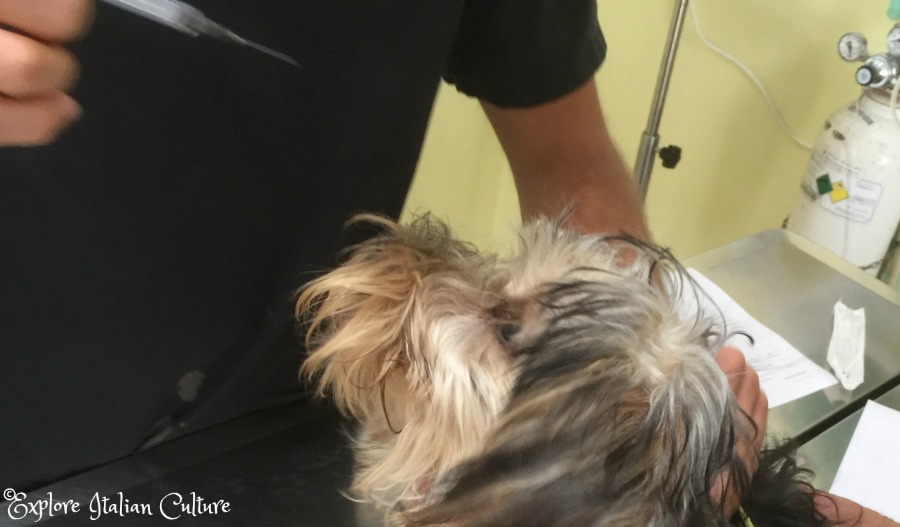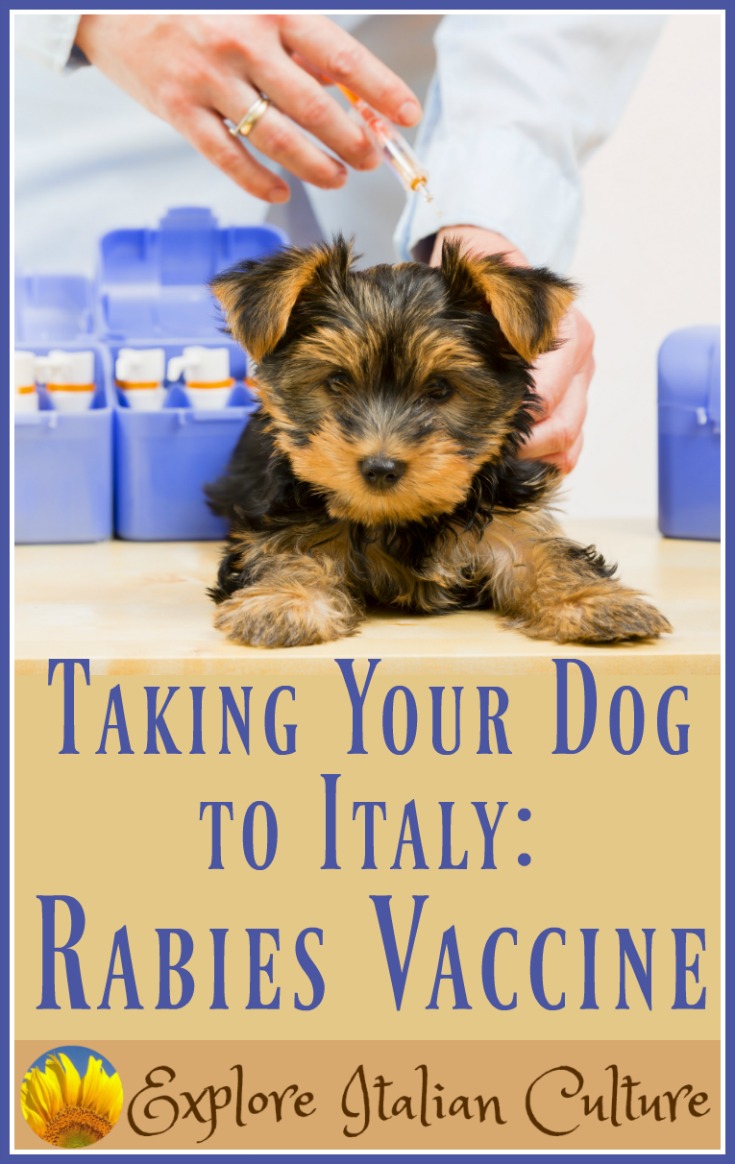The canine rabies vaccine: what it is, when to give it and what the side effects may be
Canine rabies vaccine.
If you're considering taking your pet to Italy, whether for a vacation or to live, s/he will need the rabies vaccine.
Many people are confused about what it is, why it's compulsory, when it can be given, whether blood tests are necessary and what the potential side effects might be.
We know the feeling.
For the past ten years, all our dogs have had the rabies vaccine - so we're aware of exactly what needs to happen.
But the first time we looked into it, we found the regulations really confusing. It has all been simplified since then, but it's still not always clear.
So, we decided to put this information page together in order that hopefully, you won't be as confused as we were!
By the end of this article you will know definitively what the answers are, and you'll be able to balance the pros and cons so you can make the best travel decision possible for your pet.
We would also encourage you to discuss the options with your own veterinarian who knows your dog, knows what the legal requirements are, and can advise about the potential problems.
Please note: these regulations include all dogs and cats, including service animals.
Canine Rabies Vaccine
This is quite a long article. Here's what's covered. If you don't want to read it all, simply find the section that applies to you and click on the link.
Why is the rabies vaccine necessary?
When's the best time to give it?
What are the potential side effects?
Why is a rabies shot necessary?
It's not just a mindless regulation. Human and canine rabies are almost always fatal. But they've been more or less completely wiped out in most European countries by the large-scale vaccination of dogs, cats and ferrets. Europe, understandably, wants to keep it that way.
If you intend to take your dog, cat or ferret (!) to Italy, whether it's a short trip or to live there full-time, you'll need to have either a European Union Veterinary Certificate (coming from the United States) or a pet passport (from within any European Union member state).
As part of the conditions of both, the animal is required by law to have had a rabies vaccine. The shot must be administered and signed off by a registered veterinarian.
For a first inoculation, more than three weeks must elapse before the date of travel. For a booster shot, travel can take place immediately, provided the booster is given before the previous vaccine date has expired.
What exactly is the canine rabies vaccine?

It's actually an anti-rabies vaccination. It protects your pet against rabies, and at the same time makes sure s/he cannot transmit it to any other animal or person.
It's given by a needle placed under the animal's skin, usually in the fleshy part of the neck between the shoulders. It doesn't hurt the animal any more than injections hurt you - it's just a pin-prick.
It's an inactive vaccine, which means the disease itself is killed and therefore not infectious.
In some countries, including the USA, it's mandatory and routine for dogs to have the rabies vaccine. In others, including the UK, it's not compulsory for animals permanently resident there.
However, it is compulsory for all dogs, cats and ferrets traveling within Europe, including Italy.
#Ad
Dog Anti-Gulping Slow Feeding Bowl
Does your dog eat too quickly?! This Anti-Gulping Bowl helps your pet to slow down when eating and makes meals take longer to consume. This helps prevent choking, dangerous after-meal bloating, and improves digestion by eating at a healthy pace.
Read more and purchase on this link.
When's the best time to give it? - Travelling from within the EU and rabies free countries
- Animals entering Italy from rabies free or rabies controlled countries - which includes the UK and USA have a straightforward procedure, as follows.
- Puppies of mother dogs who have themselves been vaccinated against rabies will carry some immunity for the first few weeks of life. For that reason, it's recommended not to vaccinate a pup against rabies before the age of twelve weeks.
 Effie, our Yorkie, was aged 22 weeks when she had her first rabies shot.
Effie, our Yorkie, was aged 22 weeks when she had her first rabies shot.- The pet must have been microchipped before the rabies vaccine is given - see this page for more details about microchipping. The documentation (pet passport or animal health certificate) then links the animal's microchip with the vaccine batch number.
- The rabies vaccine must be given three weeks or more before the date of travel.
- Booster vaccinations must be given according to the expiry date of the vaccine. Your veterinary surgeon will tell you when this is.
- In the United States, it's compulsory to have rabies shots anyway.
The canine rabies vaccine for animals traveling to Italy from high risk countries
If you're traveling to Italy from a country defined as at high risk of rabies, the legislation is different. In that case, the animal must be given the anti-rabies vaccine and, after 30 days, have a blood test.
Providing the test shows an acceptable level of rabies anti-bodies, the animal can enter Italy once three calendar months have elapsed from the day the blood was taken.
N.B. This applies only to animals coming into Italy from a high risk country.
What might the side effects be?
There are some possible side effects from the rabies vaccine, although none of our dogs have ever suffered from any of them. The most common are:
- Facial swelling
- Fever
- Vomiting
- Lethargy.
For that reason, most vets will suggest you wait at the surgery with your pet for an hour or so after the inoculation has been given, even if it's a booster.
Keep an eye out for two or three days afterwards and, if there are any unusual symptoms, take your dog or cat back to the vet immediately.
If there are any signs that your pet dog or cat has reacted badly to the rabies vaccine, on no account should it be given again. The result could be fatal.
So - what's the best decision for your pet?

- If you're moving to live in Italy and you want to take your dog or cat with you, there is no alternative - s/he has to have the rabies vaccine or s/he will not be admitted.
- If you're travelling to Italy for a shorter time, you have a decision to make. Is it really necessary to bring your dog or cat with you?
- Within the EU this isn't so much of a problem. We travel from Italy to the UK and back twice a year by car with our dogs. It's a long journey, but manageable. Flights within the EU are short and most airlines cater for animals either in the cabin or in the hold, depending on size.
- From further afield though, such as the United States, it's not as easy. Don't forget - it's not just the rabies inoculation. There's a long flight which in itself can be stressful for animals, particularly if they have to be carried in the hold.
- There are hotel policies to consider - although Italy is generally a dog-friendly country, most do not accept dogs above 10 kilos in weight.
- And do you honestly think your pooch will be happy trailing round Rome in the heat?
- However much you will miss your pets, it may be better to find them a comfortable place to stay while you take your holiday.
And finally ... returning from Italy to your own country
- The laws governing different countries are many and diverse, so it's not possible to cover them all here.
- Make sure you check your own country's regulations about accepting pets before you travel, so you know exactly what will be required on your return.
- In particular, if you're travelling to the UK you will need to use approved routes and carriers, and have your dog treated against tapeworm by a registered vet. Check out the UK government regulations which are here.
If you found this page useful, you may like these too.
Just click on the pic to go to that page.
Sources and further reading
Here are lists of countries that are either Rabies free, rabies controlled and/or high risk rabies countries.









